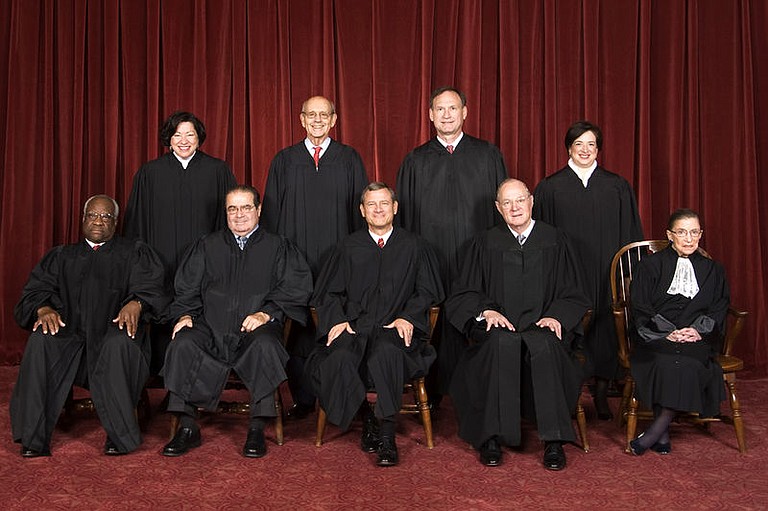The Supreme Court of the United States: Top row (left to right): Associate Justice Sonia Sotomayor, Associate Justice Stephen G. Breyer, Associate Justice Samuel A. Alito, and Associate Justice Elena Kagan. Bottom row (left to right): Associate Justice Clarence Thomas, Associate Justice Antonin Scalia, Chief Justice John G. Roberts, Associate Justice Anthony Kennedy, and Associate Justice Ruth Bader Ginsburg. Photographed in 2010. Steve Petteway
Thursday, June 28, 2012
In a 5-4 decision with Chief Justice John Roberts as the "swing" vote and author of the decision, the 2010 Affordable Care Act was upheld, including the controversial insurance "mandate," although as a tax. Roberts notes in the opinion that it would not survive the Commerce clause of the Constitution, but because the effect of not complying with the mandate is a "tax," then Congress does have that authority.
Read the JFP's 'Obamacare' and Mississippi story from Fall 2011 for a look at how the law is (and will) affect Mississippians.
Update: Live-blogging at http://scotusblog.com/, Amy Howe explains:
The Affordable Care Act, including its individual mandate that virtually all Americans buy health insurance, is constitutional. There were not five votes to uphold it on the ground that Congress could use its power to regulate commerce between the states to require everyone to buy health insurance.
However, five Justices agreed that the penalty that someone must pay if he refuses to buy insurance is a kind of tax that Congress can impose using its taxing power. That is all that matters
Because the mandate survives, the Court did not need to decide what other parts of the statute were constitutional, except for a provision that required states to comply with new eligibility requirements for Medicaid or risk losing their funding. On that question, the Court held that the provision is constitutional as long as states would only lose new funds if they didn't comply with the new requirements, rather than all of their funding.



Comments
tstauffer 11 years, 10 months ago
A very interesting note from "Lyle" from Scotusblog:
This is interesting because technically they shouldn't have decided the law if it's a tax -- the Anti-Injunction Act (frequently called "an obscure law" but that came up during oral arguments) would preclude the court from bringing an injunction against a tax until it is actually collected.
tstauffer 11 years, 10 months ago
And this, also Scotusblog:
This makes sense, really; I'm a little surprised, in hindsight, that the legislation didn't say this more explicitly at the outset. ACA has, as one component, a tax on all Americans; if you have a qualifying insurance policy, however, you get a deduction against that tax. (Just like if you have a qualifying mortgage, you get a deduction against taxes you otherwise have to pay. You don't have to buy a house if you don't want to.)
latashawillis 11 years, 10 months ago
Hmm, so some folks are sending out tweets about http://www.latimes.com/business/money...">moving to Canada because of the ruling. Bless their hearts. Don't they know that Canada has socialized medicine already?
Sign in to comment
Or login with:
OpenID